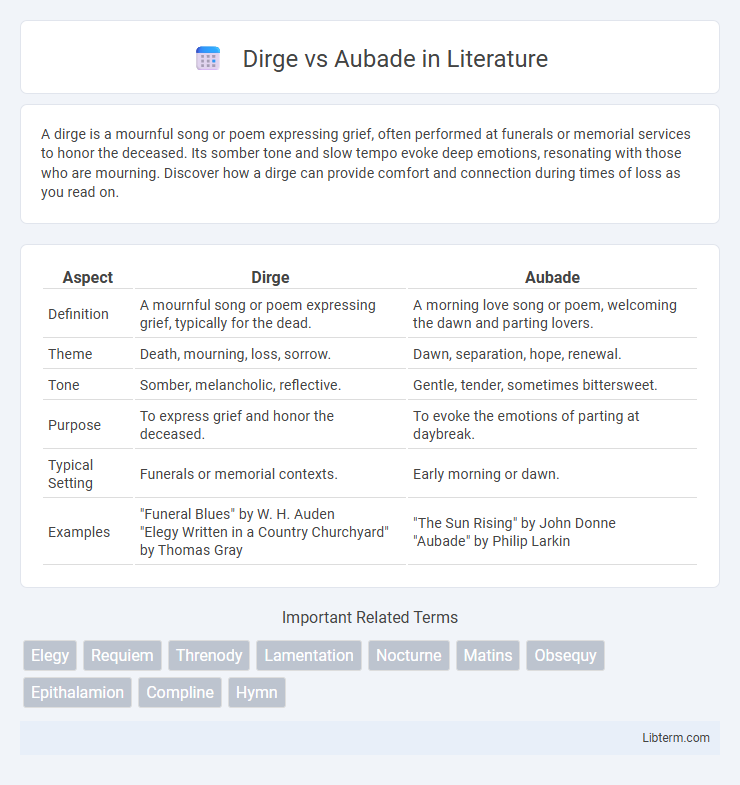A dirge is a mournful song or poem expressing grief, often performed at funerals or memorial services to honor the deceased. Its somber tone and slow tempo evoke deep emotions, resonating with those who are mourning. Discover how a dirge can provide comfort and connection during times of loss as you read on.
Table of Comparison
| Aspect | Dirge | Aubade |
|---|---|---|
| Definition | A mournful song or poem expressing grief, typically for the dead. | A morning love song or poem, welcoming the dawn and parting lovers. |
| Theme | Death, mourning, loss, sorrow. | Dawn, separation, hope, renewal. |
| Tone | Somber, melancholic, reflective. | Gentle, tender, sometimes bittersweet. |
| Purpose | To express grief and honor the deceased. | To evoke the emotions of parting at daybreak. |
| Typical Setting | Funerals or memorial contexts. | Early morning or dawn. |
| Examples | "Funeral Blues" by W. H. Auden "Elegy Written in a Country Churchyard" by Thomas Gray |
"The Sun Rising" by John Donne "Aubade" by Philip Larkin |
Introduction to Dirge and Aubade
Dirge and aubade are distinct musical or poetic forms conveying different emotional tones and themes. A dirge is a somber song or lament expressing mourning or grief, traditionally associated with funerals and memorials. An aubade, by contrast, is a morning love song or poem celebrating the dawn and the parting of lovers at daybreak.
Definition of Dirge
A dirge is a somber song or poem expressing mourning or lamentation, often performed at funerals to honor the deceased. It is characterized by slow tempo, solemn tone, and themes of grief and loss. Unlike an aubade, which is a morning love song typically celebrating dawn and parting, a dirge focuses on sorrow and remembrance.
Definition of Aubade
An aubade is a musical or poetic composition traditionally performed at dawn, celebrating the arrival of morning and often expressing themes of parting lovers. Unlike a dirge, which is a somber lament for the deceased typically associated with funerals or mourning, an aubade captures the freshness of daybreak and the bittersweet emotions tied to separation at sunrise. Originating from medieval courtly love traditions, aubades symbolize new beginnings and the ephemeral nature of night's end.
Historical Origins of Dirge and Aubade
Dirges originated in medieval Europe as solemn funeral songs performed during mourning rituals to honor the deceased, often linked to Christian liturgical traditions. Aubades trace back to troubadour poetry of the High Middle Ages in Southern France, serving as morning songs that bid farewell to lovers at dawn. Both forms evolved through distinct cultural and social contexts, reflecting contrasting themes of death and dawn.
Thematic Differences: Mourning vs. Morning
Dirges evoke themes of mourning by expressing grief, loss, and lamentation often in funeral or memorial contexts, embedding a somber and reflective tone throughout. Aubades contrast sharply by celebrating themes of morning and awakening, typically focusing on renewal, hope, and the transition from night to day with a lighter, more optimistic atmosphere. These thematic differences highlight how dirges serve to honor and remember the deceased, while aubades emphasize new beginnings and the promise of a fresh start.
Literary Examples of Dirges
Dirges are solemn songs or poems expressing mourning, exemplified by Shakespeare's "Under the Greenwood Tree" and Yeats's "The Song of the Old Mother," which evoke grief through melancholic tone and imagery. Unlike aubades, which celebrate the dawn or parting lovers, dirges often emphasize themes of death, loss, and remembrance, as seen in Dylan Thomas's "Do Not Go Gentle into That Good Night." These literary examples illustrate dirges' role in capturing emotional depth and the human response to mortality.
Literary Examples of Aubades
Aubades are morning love songs or poems that celebrate the dawn, often expressing the bittersweet parting of lovers at daybreak, with literary examples such as John Donne's "The Sun Rising" and Philip Larkin's "Aubade." These works emphasize themes of love, separation, and the passage of time within the context of sunrise, contrasting sharply with dirges, which are mournful laments typically associated with funerals or death. The semantic distinction highlights the emotional tone, where aubades convey hope or longing at dawn while dirges express grief and loss.
Emotional Tone and Atmosphere
A dirge conveys a somber, mournful emotional tone, often evoking sorrow and grief that permeate a funeral or memorial atmosphere. In contrast, an aubade presents a gentle, hopeful emotional tone, typically capturing the quiet beauty and intimacy of dawn's early hours. The dirge's atmosphere is heavy and reflective, while the aubade's mood is serene and uplifting.
Usage in Modern Literature and Music
Dirges in modern literature and music often convey themes of mourning and loss, frequently used in elegies, memorial poems, and somber compositions to evoke deep emotional reflection. Aubades appear in contemporary works as morning songs that explore themes of parting, renewal, or the bittersweet moments at dawn, commonly found in romantic poetry and lyrical music. Both forms function as expressive devices, with dirges emphasizing sorrow and aubades highlighting transition and hope within modern artistic contexts.
Conclusion: Comparing Impact and Purpose
Dirges evoke deep sorrow and mourning through slow, somber tones, serving to honor the deceased and facilitate collective grief. Aubades convey hope and renewal at dawn, celebrating new beginnings and love's promise with uplifting melodies. The contrasting impact lies in dirges' focus on loss and reflection, while aubades inspire optimism and renewal, highlighting their distinct emotional purposes.
Dirge Infographic

 libterm.com
libterm.com